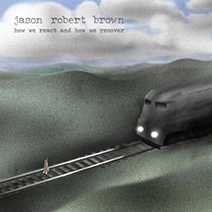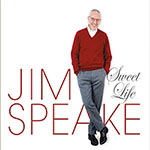Jason Robert Brown
How We React and How We Recover
(Ghostlight Records)
December 26, 2018
Reviewed by Alix Cohen for Cabaret Scenes
 This songwriter can sing. There’s nothing like hearing a writer perform his own material for authenticity of intention. Jason Robert Brown has a genial voice that can open up without stress and express yearning, bounce, and a smile.
This songwriter can sing. There’s nothing like hearing a writer perform his own material for authenticity of intention. Jason Robert Brown has a genial voice that can open up without stress and express yearning, bounce, and a smile.
The material, like that for his musical theater scores, is a mixed bag. Much of this is due to the juxtaposition of a pop/rock or Hollywoodized musical treatment and literate lyrics. I’d wish he’d get someone else to do the arrangements. So much good writing (and, for me, meaning) is lost in overproduced/ homogenized accompaniment.
“Fifty Years Long,” for example, is a straight-from-the-hip country song (possibly rockabilly) whose emotion is drowned in elaborate back-up. “Hallowed Ground” finds sentimental, balladic reminiscence lost in syncopation. “Caravan of Angels,” which arrives with gospel overtones, misses an opportunity to hear unseen “helpers” buoying its love story.
Apparently written the day after the 2016 presidential election, “Hope” resonates beyond its inspiration: “It must be there/Fear never wins/That’s what I ‘hope’/See? I said “hope”/The work begins.
” It’s unfussy, its aim is true, its effect direct.
Guest Kate McGarry brings pith and sympathy to “One More Thing That I Can Handle,” the story song of a woman sorely tempted to become a mistress. The lyric is flat-out true. The tone is contemporary without regressing into colloquial: “God, your beautiful…(but) Close me like a bank account/Drop me at the bottom of your memories/And leave me there.” A noir piano adds immeasurably. McGarry’s vocal is mature enough to know better, but palpably suffering. Rounded scat fits. Speaking of vernacular, I’d be happy to never hear a pandering lyric like “it’s been re-grammed, re-posted, and retweeted again” (from “Everybody Knows”).
“Melinda” hangs out on a fire escape and salsas down the streets of a New York hood. “I’m the boy with his feet/On the street/Hunting down the sound/With his ears like an antenna.” The arrangement is infectious, painterly. The sax sashays high, wide, and gritty. I defy you to sit still. This is a white boy’s song of appreciative immersion. He sees the dirt but sings above it. It works.
Provoked by the Sandy Hook tragedy, as Brown states it’s “not just the killing of innocent people, but the fetishization of this weapon,” “A Song About Your Gun” delivers smart, solid resistance in the illusory packaging of a rocking tune, as if those packing wouldn’t hear the lyric till half way through. Brown bites into the number with gusto. There’s swell use of a violin. “Who’s gonna tell the world you’ve been maligned and disrespected.” Right on!
“Wait Till You Hear What’s Next” was written for the finale of Prince on Broadway, the anthology of Harold Prince shows. (Prince was Brown’s mentor. The song wasn’t used.) It skibbles down a road with exuberant anticipation, earnest and hopeful.





